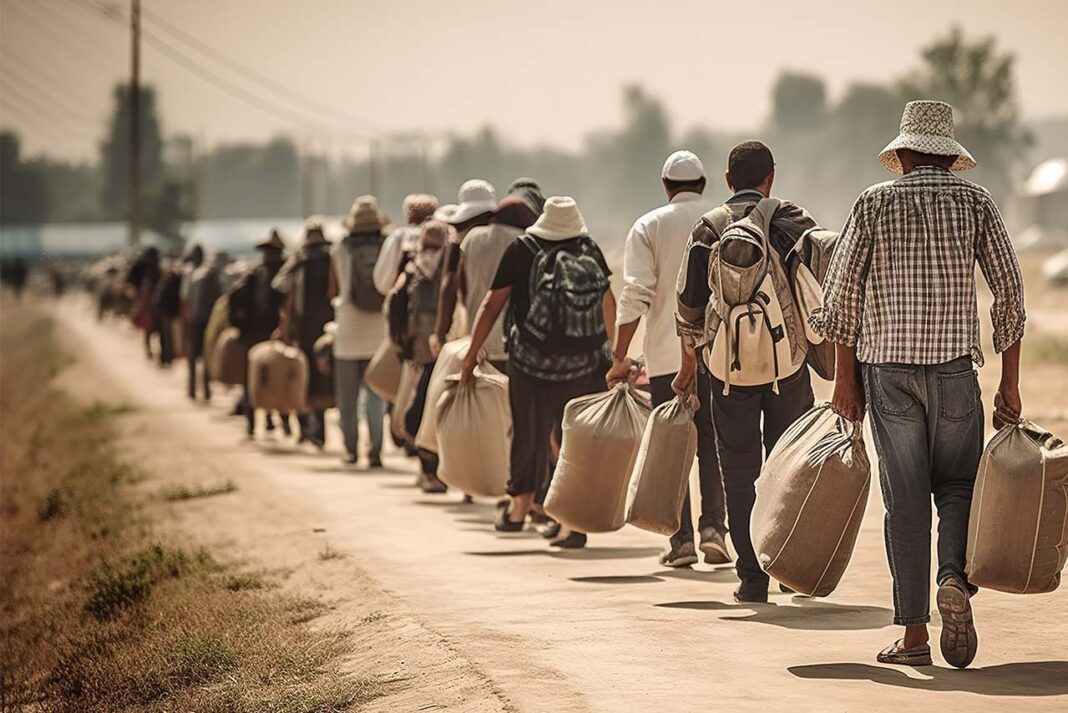Migration is a transformative and challenging process in a person’s life, sometimes forced and sometimes chosen. In most cases, immigrants don’t voluntarily abandon their own culture, but they are forced to do so. However, migration is not merely a physical change of location, as is commonly believed; it’s also a psychological separation from their roots. Sometimes people migrate for a better tomorrow, and sometimes to hold on to life. In this process, individuals may have to leave behind not only a country but also their language, traditions, family and social ties, and their very identity. While adapting to a new language and pursuing education, they often feel misunderstood, and their self-confidence can easily be damaged. Adapting to a new and different culture requires an essential psychological burden and challenge and can also lead to internal conflicts. This can further exacerbate an individual’s problems of belonging. Immigrants may have to struggle with many psychological problems during this process; problems of belonging can be a significant cause of psychological distress, especially for children and adolescents. Furthermore, the social exclusion immigrants face can make them more prone to committing crimes.
Depression and Anxiety in Immigrants: Psychosocial Challenges and Risk Factors
Immigrants often experience numerous challenges in a new society where they struggle to adapt. During this period, they may experience loneliness, insecurity, and feelings of lack of belonging. “Some studies estimate the prevalence of depression among immigrants to be around 15%, though rates vary depending on context and population (Fazel et al., 2012, p. 270). Another factor to consider is the loss and separation experienced during the migration process. Experts describe such experiences as “migration pain” or “migration grief.” This is directly related to psychological illnesses such as depression. The migration process is generally evaluated at two levels. The first is the war and uncertainty that led to migration; the second is settling in a new place, adaptation, and exclusion. For example, exclusion at school, difficulties in adapting to peer groups, and self-questioning and searching for a new identity can all occur, placing additional psychological pressure on the individual. This can negatively impact academic and social development.
Psychological anxieties about war, death, or loss can be particularly common. Individuals who experience war, death, or loss are generally more likely to develop Post-Traumatic Stress Disorder (PTSD). This situation is even more challenging in adolescents and children. In this case, the research by Suárez-Orozco et al. (2009) stands out. They suggest that immigrant children may experience a feeling of being “stuck between two cultures.” The authors emphasize the psychological burden of this process by stating, “Immigrant youth may experience identity confusion because they must both maintain their family’s culture and adapt to the rules of a new society” (Suárez-Orozco et al., 2009, p. 725). This sense of confusion increases the risk of anxiety disorders and depression in child and adolescent immigrants. Forced immigrants may experience long-term trauma.
Fazel et al. (2012) conducted a study on the mental health of immigrants, stating, “Traumatic experiences and social exclusion increase the risk of antisocial behavior in immigrants” (Fazel et al., 2012, p. 270), emphasizing the greater psychosocial stress factors immigrants face compared to the general population. This situation carries the risk of isolating oneself from the outside world in later stages. These findings demonstrate that the psychological aspect of immigration is a significant problem that cannot be ignored. Additionally, Fazel and the authors argue that these problems are more prevalent in girls. He emphasizes that their children have a higher rate of mental health than men.
Factors Supporting the Mental Health of Immigrants
Immigrants can experience profound psychological recovery despite the obstacles they face. Under various circumstances, the mental health of immigrants can be supported. Among these, easy access to intercultural language training programs and cultural support services is prominent. It is also important to promote motivation while maintaining family and community support. Immigrants need to be strongly motivated to make a significant contribution to the diversity of their societies. Therefore, individuals from all walks of life, such as teachers, psychologists, and employers, should adopt a more empathetic and inclusive approach. Social spaces should be created to simultaneously analyze individuals and allow them to express their feelings freely and without fear of judgment.
Conclusion
In conclusion, every migration is a new beginning. While society may view it as merely a physical displacement, it is also a profound psychological battle. Immigrants carry not only their luggage but also an even greater burden. Therefore, their mental burden. Hence, migrants need support to reduce their psychological impact. Let’s not forget that every migrant deserves to be understood and carries a silent story in their luggage. Hearing these stories requires not only individual effort but also social sensitivity and empathy.
References:
Fazel, M., Wheeler, J., & Danesh, J. (2005). Prevalence of serious mental disorder in 7000 refugees resettling in western countries: A systematic review. The Lancet, 365(9467), 1309–1314. https://doi.org/10.1016/S0140-6736(05)61027-6
Fazel, M., Reed, R. V., Panter-Brick, C., & Stein, A. (2012). Mental health of displaced and refugee children resettled in high-income countries: Risk and protective factors. The Lancet, 379(9812), 266–282. https://doi.org/10.1016/S0140-6736(11)60051-2
Suárez-Orozco, C., Suárez-Orozco, M. M., & Todorova, I. (2009). Learning a new land: Immigrant students in American society. Harvard University Press.


